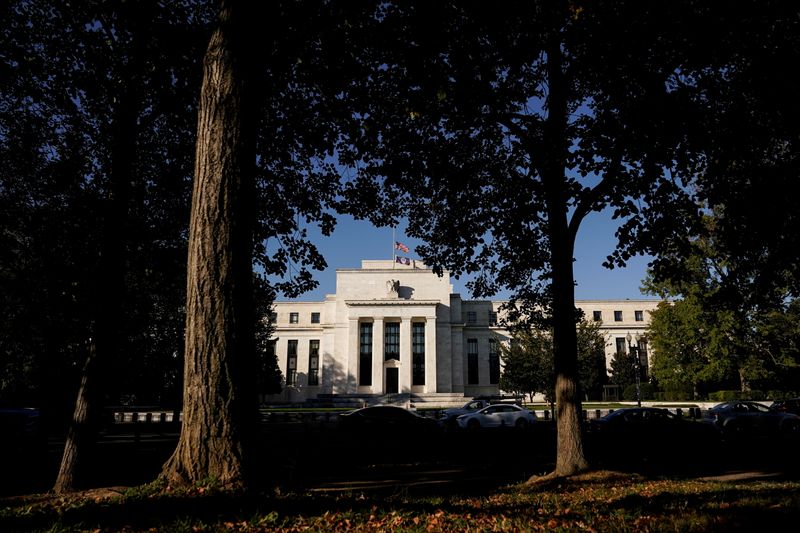Investing.com -- Bets that the Federal Reserve will raise interest rates next week rise after a surprise hike in borrowing costs by the Bank of Canada. Meanwhile, GameStop shakes up its leadership team, terminating its chief executive officer and appointing meme stock community favorite Ryan Cohen as executive chairman.
1. U.S. Treasury yields surge after Bank of Canada rate rise
U.S. yields inched higher on Thursday, tacking on to a big overnight jump, as investors gauged the outlook for Federal Reserve policy following an unexpected interest rate hike by the Bank of Canada.
On Wednesday, the Bank of Canada increased its policy rate, ending a recent pause on policy tightening. The central bank argued that the move was necessary to combat stubbornly elevated inflation.
Coupled with a rate rise by the Reserve Bank of Australia earlier this week, the BoC's decision boosted bets that the Fed will follow suit at its highly anticipated meeting next week. The chance that the U.S. central bank will hike rates by 25 basis points -- and not temporarily halt a long-standing tightening campaign -- has now gone up to 32.2% from 21.8% on June 6, according to the CME Group's FedWatch Tool.
2. Futures flat with Fed meeting approaching
U.S. stock futures hovered largely around the flatline as investors looked ahead to the all-important Federal Reserve policy meeting next week.
In the prior session, the broad-based Dow Jones Industrial Average gained 0.27%. Meanwhile, the benchmark S&P 500 and Nasdaq Composite both dipped, pumping the brakes on a recent rally.
With a fraught debt ceiling drama in Washington now resolved and earnings season coming to a close, attention is turning to the Fed's two-day gathering starting on June 13. On the data front, the major release will be the May U.S. consumer price index next Tuesday, which some analysts say could prove to be pivotal in determining whether policymakers choose to hike interest rates or push pause on further tightening.
3. GameStop shares slide after CEO Matt Furlong terminated
Shares in GameStop (NYSE:GME) shed more than 17% of their value in premarket trading on Thursday after the video game retailer announced that it had "terminated" chief executive officer Matt Furlong and appointed Ryan Cohen as executive chairman.
Furlong also stepped down from the board on June 5, GameStop said. The business noted in a regulatory filing that his "resignation did not result from any disagreement with the Company on any matter relating to the Company’s operations, policies or practices."
Cohen, whose investment in GameStop helped turn him into a darling for investors in meme stocks, previously joined the board in 2021. He later became chairman in June of that year.
The shake-up comes as GameStop attempts to boost sales, which have been under increasing pressure as downloadable console games dissuade shoppers from buying the hard copies sold at its shops. First quarter results released on Wednesday missed Wall Street estimates.
4. State-backed Chinese banks slash deposit rates
China's four big government-sponsored lenders said they have lowered their rates on yuan deposits, as Beijing seeks to support a post-pandemic recovery that is showing signs of flagging.
Industrial and Commercial Bank of China, Agricultural Bank of China Ltd., Bank of China Ltd., and China Construction Bank Corp., all slashed the rates on deposits by 5 basis points, according to the companies' websites. Three-year and five-year time deposits were also brought down by 15 basis points.
It is the second time in less than a year that these banks have rolled out deposit cuts.
The moves come as China is attempting to boost consumption and investment in the wake of data that has shown disappointing exports and a struggling property market. The world's second-largest economy had enjoyed a resurgence in the first quarter following the lifting of harsh COVID-19 restrictions, but that initial sugar rush could now be waning.
5. Oil choppy after mixed U.S. fuel inventories
Oil prices were volatile on Thursday as traders attempted to digest mixed fuel inventories and gauge the outlook for crude demand.
Official data on Wednesday showed that U.S. crude inventories unexpectedly fell last week. But gasoline stockpiles grew for the first time in five weeks -- a development that came as a surprise given it occurred at the start of the summer driving season, which usually drives a sharp uptick in U.S. fuel demand.
The numbers were the latest twist in an up-and-down week for the crude market. Early gains spurred on by Saudi Arabia’s unexpected production cut have quickly dissipated after the release of weak Chinese trade data led to worries about the state of the recovery in the world's biggest oil importer.
